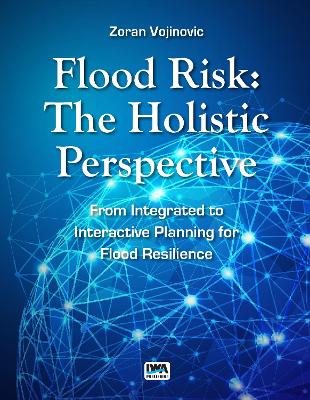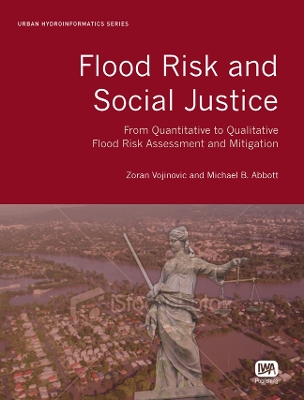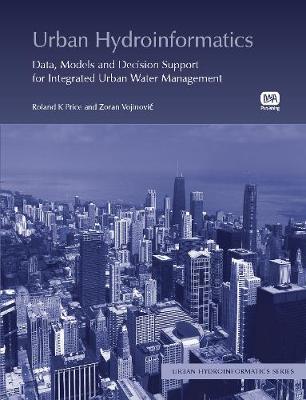Urban Hydroinformatics
3 total works
According to the International Disaster Database (EM-DAT), over the last seventy years, floods have shown the fastest rate of increase relative to any other type of disasters. Devastation due to these events occurs almost daily. Even though our technological capabilities for dealing with floods have advanced rapidly over the same period, and while global economic growth per capita has doubled, flood events have become ever more disastrous. Does this mean that our technological developments have advanced independently from the social and wider ecological needs?
Flood Risk: The Holistic Perspective is a direct response to this question and it argues that this paradoxical situation is a result from our narrow and fragmented perception of reality which has been characteristic of our academic disciplines and government agencies. It suggests that the way forward can be found only if we broaden our view and learn how the natural or social phenomena can provoke a response in a society, or a social group, which in turn can trigger the technical developments, and so on, again and again, in what has the potential to become a network of interactions and relationships through positive feedback (or coevolving) cycles. The holistic perspective however may raise the following question: If everything is connected to everything else, how can we ever hope to understand anything? Our response draws from the understandings brought by complexity theory where individual elements coevolve together both in development and application. This recognition opens a new analysis which goes beyond the direct objects or actors of concern (risk forecasting, early warning, land-use planning technology and systems for example), and into the relationships between them. The book suggests that our initial response to this and many other challenges is to change our perception from a disciplinary and defensive one to a progressive (or transcendental) and transdiciplinary, i.e., the one that turns challenges into the possibilities that can re-shape our future.
The book is structured in eight chapters. Chapter 1 provides exposure to the complexity of flood-related issues and illustrates diversity of multiple points of view. Chapter 2 elaborates on the history of holistic thinking with connection to the flood resilience process. Chapter 3 discusses the holistic risk governance approach which progresses beyond the integrated urban flood management. Chapter 4 describes the Green Cities Initiative, an initiative which is essentially holistic in its nature as it aims to improve transport, energy efficiency, industrial metabolism including water supply and distribution as well as drainage and sewerage services through the holistic lens of interactions between different sectors. Chapter 5 discusses various risk assessment practices and it concludes that any practice that omits social, ethical and wider ecological points of view will be severely restricted in its scope and its reach. Chapter 6 describes the root causes of floods in the Pasig-Marikina River Basin in Metro Manila, Philippines. Chapter 7 reflects upon the key issues and challenges from 2011 Thailand floods. Finally, Chapter 8 presents some of the key aspects concerning urban stormwater management practice in Beijing, China.
Flood Risk: The Holistic Perspective is a direct response to this question and it argues that this paradoxical situation is a result from our narrow and fragmented perception of reality which has been characteristic of our academic disciplines and government agencies. It suggests that the way forward can be found only if we broaden our view and learn how the natural or social phenomena can provoke a response in a society, or a social group, which in turn can trigger the technical developments, and so on, again and again, in what has the potential to become a network of interactions and relationships through positive feedback (or coevolving) cycles. The holistic perspective however may raise the following question: If everything is connected to everything else, how can we ever hope to understand anything? Our response draws from the understandings brought by complexity theory where individual elements coevolve together both in development and application. This recognition opens a new analysis which goes beyond the direct objects or actors of concern (risk forecasting, early warning, land-use planning technology and systems for example), and into the relationships between them. The book suggests that our initial response to this and many other challenges is to change our perception from a disciplinary and defensive one to a progressive (or transcendental) and transdiciplinary, i.e., the one that turns challenges into the possibilities that can re-shape our future.
The book is structured in eight chapters. Chapter 1 provides exposure to the complexity of flood-related issues and illustrates diversity of multiple points of view. Chapter 2 elaborates on the history of holistic thinking with connection to the flood resilience process. Chapter 3 discusses the holistic risk governance approach which progresses beyond the integrated urban flood management. Chapter 4 describes the Green Cities Initiative, an initiative which is essentially holistic in its nature as it aims to improve transport, energy efficiency, industrial metabolism including water supply and distribution as well as drainage and sewerage services through the holistic lens of interactions between different sectors. Chapter 5 discusses various risk assessment practices and it concludes that any practice that omits social, ethical and wider ecological points of view will be severely restricted in its scope and its reach. Chapter 6 describes the root causes of floods in the Pasig-Marikina River Basin in Metro Manila, Philippines. Chapter 7 reflects upon the key issues and challenges from 2011 Thailand floods. Finally, Chapter 8 presents some of the key aspects concerning urban stormwater management practice in Beijing, China.
Flood Risk and Social Justice
by Zoran Vojinovic and Professor Michael B. Abbott
Published 5 March 2012
Flood Risk and Social Justice is a response to the rising significance of floods and flood-related disasters worldwide, as an initiative to promote a socially just approach to the problems of flood risk. It integrates the human-social and the technological components to provide a holistic view.
This book treats flooding as a multi-dimensional human and natural world tragedy that must be accommodated using all the social and technological means that can be mobilised before, during and after the flooding event. It covers socially just flood risk mitigation practices which necessitate a wide range of multidisciplinary approaches, starting from social and wider environmental needs, including feedback cycles between human needs and technological means. Flood Risk and Social Justice looks at how to judge whether a risk is acceptable or not by addressing an understanding of social and phenomenological considerations rather than simple calculations of probabilities multiplied by unwanted outcomes and their balancing between costs and benefits.
It is argued that the present ‘flood management’ practice should be largely replaced by the social justice approach where particular attention is given to deciding what is the right thing to do within a much wider context. Thus it insists upon the validity of modes of human understanding which cannot be addressed within the limited context of modern science. Flood Risk and Social Justice is written to support a wide range of audiences and seeks to improve the dialogue between researchers and practitioners from different disciplines (including post-graduate engineering, environmental and social science students, industry practitioners, academics, planners, environmental advocacy groups and environmental law professionals) who have a strong interest in a new kind of social justice work that can act as a continuous counter-balance to the various mechanisms that unceasingly give rise to profound injustices.
More information about this book can be found in this article written for the WaterWiki by the author: http://www.iwawaterwiki.org/xwiki/bin/view/Articles/FloodRiskandSocialJustice
Authors: Zoran Vojinovic is Associate Professor at the UNESCO-IHE Institute for Water Education, Delft, the Netherlands, with almost 20 years of consulting and research experience in various aspects of water industry in New Zealand, Australia, Asia, Europe, Central/South America and the Caribbean. Michael B. Abbott is Emeritus Professor at the UNESCO-IHE Institute for Water Education, Delft, the Netherlands, and a Director of the European Institute for Industrial Leadership in Brussels. He founded and developed the disciplines of Computational Hydraulics and Hydroinformatics and co-founded, the Journal of Hydroinformatics with Professor Roger Falconer.
This book treats flooding as a multi-dimensional human and natural world tragedy that must be accommodated using all the social and technological means that can be mobilised before, during and after the flooding event. It covers socially just flood risk mitigation practices which necessitate a wide range of multidisciplinary approaches, starting from social and wider environmental needs, including feedback cycles between human needs and technological means. Flood Risk and Social Justice looks at how to judge whether a risk is acceptable or not by addressing an understanding of social and phenomenological considerations rather than simple calculations of probabilities multiplied by unwanted outcomes and their balancing between costs and benefits.
It is argued that the present ‘flood management’ practice should be largely replaced by the social justice approach where particular attention is given to deciding what is the right thing to do within a much wider context. Thus it insists upon the validity of modes of human understanding which cannot be addressed within the limited context of modern science. Flood Risk and Social Justice is written to support a wide range of audiences and seeks to improve the dialogue between researchers and practitioners from different disciplines (including post-graduate engineering, environmental and social science students, industry practitioners, academics, planners, environmental advocacy groups and environmental law professionals) who have a strong interest in a new kind of social justice work that can act as a continuous counter-balance to the various mechanisms that unceasingly give rise to profound injustices.
More information about this book can be found in this article written for the WaterWiki by the author: http://www.iwawaterwiki.org/xwiki/bin/view/Articles/FloodRiskandSocialJustice
Authors: Zoran Vojinovic is Associate Professor at the UNESCO-IHE Institute for Water Education, Delft, the Netherlands, with almost 20 years of consulting and research experience in various aspects of water industry in New Zealand, Australia, Asia, Europe, Central/South America and the Caribbean. Michael B. Abbott is Emeritus Professor at the UNESCO-IHE Institute for Water Education, Delft, the Netherlands, and a Director of the European Institute for Industrial Leadership in Brussels. He founded and developed the disciplines of Computational Hydraulics and Hydroinformatics and co-founded, the Journal of Hydroinformatics with Professor Roger Falconer.
Urban Hydroinformatics: Data, Models and Decision Support for Integrated Urban Water Management is an introduction to hydroinformatics applied to urban water management. It shows how to make the best use of information and communication technologies for manipulating information to manage water in the urban environment. The book covers the acquisition and analysis of data from urban water systems to instantiate mathematical models or calculations, which describe identified physical processes. The models are operated within prescribed management procedures to inform decision makers, who are responsible to recognized stakeholders. The application is to the major components of the urban water environment, namely water supply, treatment and distribution, wastewater and storm water collection, treatment and impact on receiving waters and groundwater, and urban flooding.
Urban Hydroinformatics pays particular attention to modeling, decision support through procedures, economics and management, and implementation in developing countries. The book is written with Post-graduate students, researchers and practicing engineers in all aspects of urban water management in mind.
Visit the IWA WaterWiki to read an article by the authors: http://www.iwawaterwiki.org/xwiki/bin/view/Articles/Urbanhydroinformatics
This title is now available in Hardback: please note change of ISBN from 9781843392743 to 9781780401362.
Urban Hydroinformatics pays particular attention to modeling, decision support through procedures, economics and management, and implementation in developing countries. The book is written with Post-graduate students, researchers and practicing engineers in all aspects of urban water management in mind.
Visit the IWA WaterWiki to read an article by the authors: http://www.iwawaterwiki.org/xwiki/bin/view/Articles/Urbanhydroinformatics
This title is now available in Hardback: please note change of ISBN from 9781843392743 to 9781780401362.


